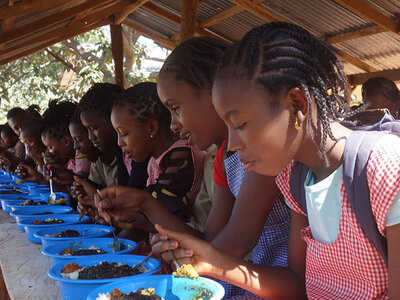Guinea
- 2.9 million
- households are food insecure
- 3.2 million
- children under 5 suffer from stunting
- 7.7 million
- people live in poverty
As Guinea continues to grapple with significant socioeconomic challenges, more than half of its population is experiencing unprecedented levels of poverty and food insecurity, along with alarming rates of malnutrition.
Over 21.8 percent of households struggle with food insecurity, and children under 5 are particularly vulnerable, with 6.1 percent suffering from global acute malnutrition, 24.4 percent from stunting (impaired growth due to malnutrition) and 12 percent being underweight. Smallholder farmers and women in rural areas face heightened vulnerability due to limited access to essential resources and opportunities.
What the World Food Programme is doing in Guinea
-
Emergency
-
WFP provides food assistance and cash transfers to meet the immediate needs of people affected by crises. Over 900,650 of crisis-affected individuals, 49 percent of whom were women, received assistance in the form of food aid and/or substance abuse treatment as part of the emergency intervention in 2023. Additionally, US$335,472 was distributed to emergency-affected populations in the form of cash transfers, to meet their basic food and nutritional needs.
-
Nutrition
-
WFP provides vital nutritious food to vulnerable populations through school meals and emergency assistance. A malnutrition prevention and treatment programme includes specialized nutritious foods and messaging. In this way, we reduce maternal malnutrition, mortality risk, low birthweight rates, and malnutrition among children under 5. In 2023, over 9,800 children aged 6 to 59 months and over 4,600 pregnant or breastfeeding women received treatment for moderate acute malnutrition.
-
School meals
-
WFP supports families in rural communities in sending their children – especially girls – to school. By providing nutritious school meals to over 175,000 pre- and primary school children in communities with high levels of food insecurity, and take-home rations to nearly 8,500 girls in sixth grade, more children can complete their primary education and become empowered to pursue further education and opportunities. In 2023, Guinea signed up to the School Meals Coalition which seeks to urgently improve and scale up school meal programmes and ensure every child’s opportunity to receive a healthy, nutritious meal in school by 2030.
-
Resilience building
-
WFP supports smallholder farmers and vulnerable communities through our Food Assistance for Assets and Smallholder Agricultural Market Support programmes, enhancing their resilience to shocks. Through its digital innovation, Farm2Go, WFP supports' access to stable agricultural markets by formalizing the connection between farmers and buyers, allowing farmers to obtain better prices for their produces. In addition, WFP provides training on best sustainable agricultural practices to enable communities to cultivate high-yielding rice varieties in 151 villages, thereby enhancing food security and boosting local economies.
-
Country capacity strengthening
-
WFP continued to provide support to the Government in 2023, particularly to the National Agency for Emergency and Humanitarian Disaster Management, the Ministry of Health, and the National Health Security Agency in 2023. Additionally, WFP is enhancing food security monitoring and nutritional strategies through training and in-depth workshops, focusing on food security and vulnerability surveys and nutrient deficiency surveys.
-
Cash transfers
-
In partnership with a private telecoms provider, WFP provides cash transfers to support 200 pre-primary and primary schools, enabling school management committees to directly purchase food from local smallholder farmers and rice parboilers’ unions. More recently, WFP introduced cash transfers to support beneficiaries under Food Assistance for Assets (FFA) activities.
Guinea news releases
Go to pagePartners and donors
Achieving Zero Hunger is the work of many. Our work in Guinea is made possible by the support and collaboration of our partners and donors, including:
View all
Find out more about the state of food security in Guinea
Visit the food security analysis pageOperations in Guinea
Contacts
Office
Cameroun, Face Cour Suprême, Conakry, République de Guinée
Conakry
Guinea
Phone
+224 626 26 27 77







